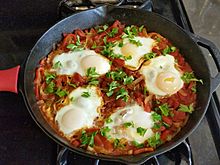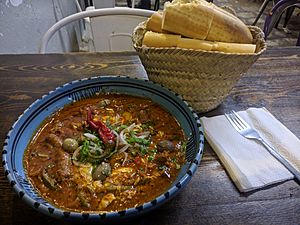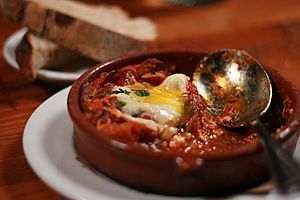Shakshouka facts for kids

Shakshouka in a cast iron pan
|
|
| Alternative names | Shakshuka, chakchouka |
|---|---|
| Type | Main dish |
| Region or state | Maghreb |
| Main ingredients | Tomatoes, harissa, eggs, olive oil |
Shakshouka (Arabic: شكشوكة) is a tasty dish from the Maghreb region in North Africa. It is made by cooking eggs in a yummy sauce. This sauce usually has tomatoes, olive oil, peppers, onions, and garlic. It is often spiced with cumin, paprika, and cayenne pepper. People believe shakshouka started in North Africa around the mid-1500s. This was after tomatoes were brought to the area by Hernán Cortés as part of the Columbian exchange. The Columbian exchange was when plants, animals, and ideas were shared between the Old World (Europe, Asia, Africa) and the New World (the Americas).
Contents
What Does the Name "Shakshouka" Mean?
The word shakshouka (Arabic: شَكْشُوكَةٌ) comes from a North African Arabic term. It means "a mixture." People are not completely sure where the word came from. However, like many names for dishes from the Maghreb, it might come from the language of the Amazigh people. These people are native to the region. In the western part of the Maghreb, the dish is sometimes called bīd wu matiša. This means "egg and tomato" in their language.
The History of Shakshouka
The exact origin of shakshouka is a bit of a mystery. Different countries like Libya, Morocco, Tunisia, Turkey, Algeria, and Yemen all claim it started with them. Tomatoes and peppers are important ingredients in shakshouka. These foods came from the Americas and became common only after the Columbian exchange.
Jewish people in North Africa have also made shakshouka for hundreds of years. When Jewish immigrants from North Africa moved to Israel in the 1950s and 1960s, they brought the dish with them. It became very popular in restaurants in Israel in the 1990s. A big reason for its popularity was a man named Bino Gabso. In 1991, he took over his father's restaurant in Jaffa, Israel, and renamed it Dr Shakshuka. Shakshouka is one of many dishes that Jewish people from Middle Eastern and North African countries brought to Israel. These dishes have become a big part of Israeli cuisine.
Shakshouka has become popular all over the world. A cookbook about Jerusalem food, written in 2012 by Israeli chef Yotam Ottolenghi and his Palestinian partner Sami Tamimi, helped a lot. Some people have discussed whether sharing food like shakshouka is always fair. However, chef Michael Solomonov said that the reason people in that region cook in similar ways is because of the Ottoman Empire. The Ottomans ruled many of these areas for a long time, and they shared food traditions.
Different Ways to Make Shakshouka

There are many ways to make shakshouka, and cooks can change how spicy or sweet it is. Some chefs add preserved lemon, salty sheep milk cheeses, olives, harissa (a spicy paste), or spicy sausages like chorizo or merguez. The eggs in shakshouka are usually poached. This means they are cooked gently in the sauce until the whites are set and the yolks are still runny. Sometimes, the eggs can also be scrambled, like in the Turkish dish menemen.
Other versions of shakshouka can include minced lamb, toasted whole spices, yogurt, and fresh herbs. Common spices are ground coriander, caraway, paprika, cumin, and cayenne pepper. Cooks in Tunisia might add potatoes, broad beans, artichoke hearts, or courgettes (zucchini). The North African dish matbukha, which is a cooked tomato and pepper salad, can also be used as the base for shakshouka.
In the 1950s, a special version of shakshouka was added to the food given to soldiers in the IDF. This version used a kosher type of Spam called loof. Kosher food follows Jewish dietary laws. In English-speaking countries, shakshouka is often eaten for breakfast because eggs are a main ingredient. But in the Arab world and Israel, it is also a popular dinner. Like hummus and falafel, it is a favorite dish in the Middle East. People often eat it with pickled vegetables, North African sausage called merguez, or simply with bread and mint tea.
In Jewish culture, people often make a large pot of tomato stew for their Sabbath dinner. The Sabbath is a day of rest. They use the leftovers the next morning to make a breakfast shakshouka with eggs. In Spain, there is a similar dish called huevos a la flamenca. This version includes chorizo and serrano ham. In Italy, there is a dish called uova in purgatorio (eggs in purgatory). This Italian version has tomato paste, anchovy, garlic, and parsley, and sometimes Parmesan cheese.
Images for kids
See also
 In Spanish: Shakshuka para niños
In Spanish: Shakshuka para niños





